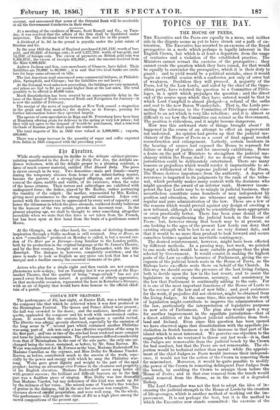COSTA'S NEW ORATORIO.
a direct addition of the highest judicial authorities from Scot- land and Ireland. Even since this question has been opened we have observedthat dissatisfaction with the appellate ju- risdiction in Scotch business is on the increase in that part of the island which is most interested. We perceive one objection to the suggestion which we ventured to throw out last week—it is, that the Judges are removeable from the judicial bench by the Crown for bad conduct, but that the Peers are not removeable. The ob- jection would be technical rather than moral : while the appoint- ment of the chief Judges as Peers would increase their independ- ence, it would not bar the action of the Crown in removing them for misconduct. Moreover, it would be quite possible to modify prophet; having an advantage over Formes in the dearness and propriety., the power of the Crown in removing delinquent Peer Judges from of his English elocution. Madame Rudersdorff never sang better ow`,ttlie bench, by enabling the Crown to arraign them before the with greater success ; the brilliant and difficult bravura air in the Part was a faultless piece of sing. Miss Dolby was less than Madame Viardot, but any deficiency of this kind was made up for,
by the richness of her voice. She missed some of Viardot's fine touches of genius in the dialogue, but In the airs her success was complete. The
choruses showed eitrAil preparation, and were well sung. On the whole, this performance will support the claim of Eli to a high place among the sacred compositions of the present age. The performance of Eli, last night, at Exeter Hall, was a triumph for the composer like that which he achieved when it was first produced at the Birmingham Festival. The Queen and Prince Albert were present ; the hall was crowded to the doors ; and the audience, heedless of eti- quette, applauded the composer and his work with unrestrained enthu- siasm. It seemed that the oratorio had undergone a careful revisal. The libretto was acInfg igeously shortened, especially by the omission of the long scene in r 'second part 'which contained another Philistine war-song, part of, doh was only a less effective repetition of the song in the first part ; and'one or two of the airs had been rendered more compact and terse by judicious compression. The performance differed considerably from that of Birmingham in the cast of the solo parts; the only one
un- changed being the tenor, sustained, as before, by Mr. Sims Reeves. Mr. Weiss was substituted for M. Formes as the bass, Madame Rudersdorff for Madame Castellon as the soprano and Miss Dolby for Madame Viardot. Reeves, as before, contributed much to the success of the work, espe- cially by the power and energy with which he sang the Philistine war-
song. by gave great dignity and weight to the part of the aged


























 Previous page
Previous page